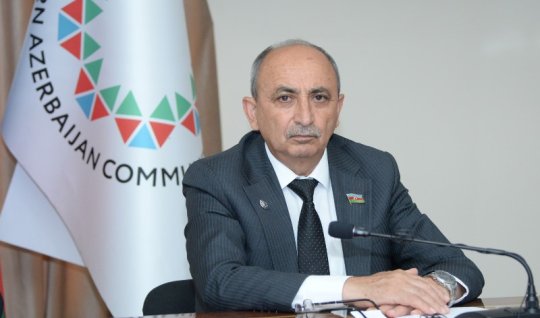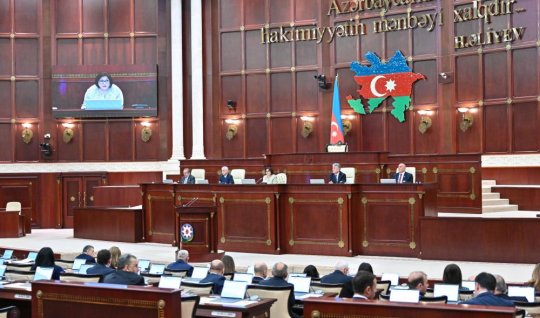“İstisu” and “Ağdam” wine will also be sold in Armenia

Speaker of the National Assembly of Armenia Alen Simonyan stated that the normalization of relations between the two countries in the long-term perspective is inevitable.
According to him, a single market will be formed between Azerbaijan and Armenia in the future, and mutual trade will become commonplace.
In his speech, Simonyan stated that Armenians and Azerbaijanis today establish joint businesses, maintain friendships, and social relations in Moscow and other countries: “There will be Azerbaijani goods in our stores, and Armenian products will be sold in Baku and other cities. The current tension and feelings of enmity will disappear over time.”
He also added, recalling that both sides suffered significant losses during the war years: “We also killed people, and people died on the Azerbaijani side. The wounds of both nations are still fresh, but this sensitivity will gradually decrease.”
According to the speaker, the main priority currently is the opening of communication lines in the region as soon as possible. This is considered an important step for both economic integration and the strengthening of confidence in the peace process.
Simonyan's speech was also met with interest in Baku. Deputy Chairman of the Milli Majlis Committee on Economic Policy, Industry, and Entrepreneurship, Azer Badamov, told Modern.az that after the signing of a peace agreement, diplomatic relations between the two countries should be restored, followed by the expansion of economic ties.
He noted that there is demand in Armenia for Azerbaijani oil, gas, and chemical industry products: “In the future, our "Istisu" mineral waters and Aghdam wine can also be sold there. There is nothing unusual about this.”
The deputy also recalled that the main obstacle is the territorial claims against Azerbaijan maintained in the Armenian constitution. Baku has repeatedly stated that a final peace agreement will not be signed without a change to this provision. The draft agreement initialed in Washington, however, indicates that the parties are taking important steps towards reaching an agreement.
Milli Majlis deputy Vugar Bayramov, on the other hand, drew attention to economic relations. According to him, the opening of communication lines and the signing of a final agreement will also pave the way for trade relations in the region: “Products with comparative advantage can be introduced to the Armenian market. The export of goods primarily from the non-oil sector seems more realistic. Armenia can also export certain products. However, time will be needed for business people to form a tradition of cooperation.”
Experts believe that if changes are made to the Armenian Constitution, the signing of a final peace agreement and the expansion of economic cooperation will become a real prospect.
-
00:47, Bu günIsrael was reportedly holding secret meetings with this country
-
00:31, Bu günWho do the Turks consider friends? – Azerbaijan is FIRST
-
7 December 2025, 23:51Ukrainians are rapidly leaving the country
-
7 December 2025, 23:40Syrians celebrated the overthrow of Bashar al-Assad - PHOTOS
-
7 December 2025, 22:31Israel will not allow Hamas!
-
7 December 2025, 21:21Hamas announced its main condition
-
7 December 2025, 19:50Volkan Demirel resigned
-
7 December 2025, 19:33Netanyahu will not leave politics
-
7 December 2025, 18:07Netanyahu wants to meet with Trump
-
7 December 2025, 15:41Russia has attacked Ukraine - casualties reported
-
7 December 2025, 15:28A new war hotbed in the world – danger increases
-
7 December 2025, 14:50China and Russia started joint missile exercises
-
7 December 2025, 13:26The Ukrainian army liberated this territory
-
7 December 2025, 12:15Trump awarded Hollywood stars - PHOTOS
-
7 December 2025, 11:41Accusation from China: Japan interfered with military exercises
-
7 December 2025, 09:24Fire at a nightclub in India - THERE ARE FATALITIES
-
6 December 2025, 22:40We have reached an agreement with America - ZELENSKY
-
6 December 2025, 21:40Armenia and Azerbaijan border guards have removed helmets and bulletproof vests - PASHINYAN
-
6 December 2025, 20:00Ukraine no longer believes in empty promises
-
6 December 2025, 19:20“I am a 'Grey Wolf' and I will die this way! - Bağçalı
-
6 December 2025, 17:32In Russia 1 percent of men “DISAPPEARED”
-
6 December 2025, 17:13Negotiations concerning Gaza are passing through a decisive stage
-
6 December 2025, 16:51Will Putin's arrest warrant be annulled?
-
6 December 2025, 14:22Turkey–Azerbaijan energy corridor will provide incredible benefits - US Ambassador
-
6 December 2025, 13:50Horrific accident in Turkey - 6 people DIED
-
6 December 2025, 12:48Second Chernobyl?
-
6 December 2025, 09:15Ukraine's Commander-in-Chief Opposed Territorial Concession
-
6 December 2025, 08:26Students in Germany protested - “We don't want to be soldiers”
-
5 December 2025, 22:15The resolution of the Ukraine conflict is imminent...
-
5 December 2025, 19:43Assad's allies are preparing for rebellion
























































